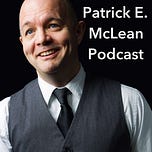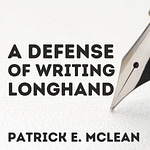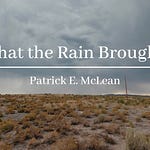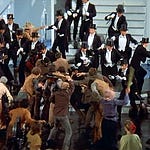The completely truthful, reasonable, and logical answer is that nobody knows. If people really knew, we would be a lot better at making them. Not just books, but movies, TV shows, plays, really anything that involves narrative art. And we're not. Hollywood bombs all the time with things that everyone expects will be great. Now, you can argue that a lot of those failures are failures because of group-think and creation by committee -- and I sympathize with that view, but auteurs fail all the time as well.
I remember going to a screening of an independent film once. And after the movie was over the two guys who made it got up on stage and talked about what they went through, and took some questions. The movie wasn't horrible, but it wasn't good either. It was just there. And they talked about how it was their dream to make this movie. How they had slaved long nights and maxed out their credit cards, really given it their all.
I love the romance and passion of it, but, even at the time I thought to myself, "Why?" If I was going to risk everything to tell a story, that wouldn't be the story I would tell. I would have spent more time writing a better script, developing a better idea. Because that one fell flat.
But most films do. Most books do. Most everything does.
And here's what's particularly maddening about that. We are all very good at knowing what we like. So you'd think that we could follow that instinct and use it to make something great with some degree of reliability. Or we could learn the knack of it from someone really good. Like, I should be able to apprentice at the feet of Taika Waititi and come back a brilliant and humane comedy director.
But it doesn't work that way. I think you could certainly spend time with Michael Bay and learn how to make a viewer dizzy and confused. But to inspire and move, to really connect with power in that way that only a story can, I don't think you can be great merely by copying someone else.
Copying someone else is a great way to start. The Rolling Stones wanted to be Muddy Waters. Robert Plant wanted to be Howlin' Wolf. They failed gloriously and became something else, that was something good.
Woody Allen has said multiple times that as a stand-up comedian and actor, he was trying to be Bob Hope. Compare clips of them side by side and you'll see it immediately.
But as Thelonius Monk said,
"The genius is the one that is most like himself."
All of these people took their impulses and ultimately used them to become more like themselves.
And I think this is true of story because every story is such a complicated knot of meaning. I think that something like a novel or a screenplay is best thought of as an intersection of systems. Dialog, plot, character selection, symbolism, description, prose style -- whatever you want to put on that list, everybody has to learn to put them together in their own way. I can no more write an authentically Taika Waititi movie than I can grow his mustache. I can grow my own mustache, and I can work to make it a good one.
All of that sounds like it should be right. But there's a stubborn fact left in the way. There are only a few kinds of stories and maybe one ultimate form. So wouldn't that be a blueprint for what makes a great story?
Well kind of. I think that following the conventions of a genre or honoring the expectations of something like the hero's journey is necessary, but not sufficient. Stories have deep structure, for sure. And as crazy as it may sound, I don't think they are socially constructed. I think they are a fundamental part of our psyche, the primary way we understand meaning and seek to deal with deep conflicts within ourselves.
Stories are structures that pop up again and again in our lives, both internally and externally.
One of the simplest, oldest, and most used forms of story is the "Overcoming the Monster" plot. Beowulf, the Epic of Gilgamesh, The story of the Cyclops in the Odyssey, All James Bond movies, Alien, Jaws, Home Alone, Rocky -- it's everywhere -- either the whole story or as a substory in a larger narrative.
Psychologically, we could look at the Overcoming the Monster plot this way. You have a terrifying problem -- terrifying because it's unknown and chaotic. You don't know what this thing is and you don't know what it's going to do. So you have to go out to face it. But it's way more powerful than you. And you don't really stand a chance. But you go face this unknown anyway. Because you don't have a choice.
The Monster very nearly kills you. You wind up at the mercy of this monster, You're on the ropes, all is lost, yet somehow you, by drawing on resources that you didn't know you had within you, stage a thrilling escape from death and overcome the creature. And -- and this is the important part -- you bring balance back to the world in which you live. In lots of stories, this is symbolized by things like getting the girl or the boy at the end, life returning to the kingdom, enemies making peace, rejoicing awards ceremonies -- all that kind of stuff.
Now when you say it like that, it sounds simple, formulaic, maybe even boring. Except for the fact this fundamental story is the fundamental human experience of being alive in a world of meaning. Which I will now demonstrate.
The monster is the Coronavirus. It's a terrifying problem that we don't know anything about -- unknown and chaotic. We don't know what it is, we don't know what it's going to do. But we have to go forth and deal with it anyway. It's reduced the kingdom to shambles -- or, if you like, revealed all the problems with kingdom, (just like the Alien in the movie Alien, reveals all the conflict between the crew of the Nostromo.)
So we go out and face it. And in doing so, we're drawing on resources we didn't know we had. We've never developed vaccines this quickly before. We've never tried.
And when the monster is conquered, even if it threatens to rise again at a later date -- after all even if you defeat a disease, disease itself is a monster that can never be overcome, balance will be brought back to the world and we will celebrate.
So what I think makes a great story is taking these deep forms we all understand and the struggles we all face, and updating them for the times we live in. Creating a new source of meaning, new narrative proofs, if you like, of eternal truths.
All of the How to Succeed in Evil stories are a form of Overcoming the Monster. But they are other things as well. And this, I think is another clue to what makes a story great. A story is never about what it's about. It's never merely about catching the killer, defeating the monster, snatching the McGuffin, or blowing up the Death Star. It's about an external problem, of course, but it's also about an internal problem. Luke has to blow up the Death Star, but to do it he has to learn to let go and trust in something bigger than himself.
It doesn't have to be so esoteric. Chief Brody in Jaws not only has to defeat both the shark and crooked politicians to save the town, but he has to overcome his internal problem -- as fear of the water.
Internal problems aren't just some kind of game that we play with stories. They are what drive us. Hound us. Threaten to destroy us and keep us in line, or drive us to great and terrible acts.
A young man named Robert Jarvik once had the same challenges of making his way in the world that everyone else faces. But when his father died of heart disease he decided to study medicine and engineering and make an artificial heart. He wasn't doing that for any external reason. Not really. On some level, he was trying to save his father by saving other people.
And so it is with the Overcoming the Monster story we are all living through right now. It follows the form of every other Overcoming the Monster story, but what would make it into a great story is the internal struggles we face. Taking the universal and making it particular.
All of these things follow themes. And themes always sound a bit daft when you say them out loud. "Love conquers all," for example. Or "Evil can only be defeated when good people choose to act."
And I think that what makes a story great is when someone manages to tell an ancient story, with a timeless theme in a way that makes it fresh and new and believable again.
Because there are things that we need to believe, even if they aren't true. Maybe especially when they aren't true. We need to believe it's important to do things for others who will live on after us, even though all the visible evidence shows that it won't matter to you. You're going to be dead and it will all be somebody else's problem.
Great stories are a vehicle for us to step out of ourselves. To try out different ways of being. To see the consequences of actions without having to take them. To simulate failure so we can avoid it and find success. And get an escape from hardship so we can better endure it.
This essay is not a great story. I'm not even convinced at this point that it's a good essay. It wanders a bit and I'm not sure I have a great close to drive to.
But one sure bit of advice I can offer you. If you like great stories, you will like them more the more you learn about how all stories work. And, if you're a writer, this kind of knowledge is pure gold and you can never have enough.














Share this post